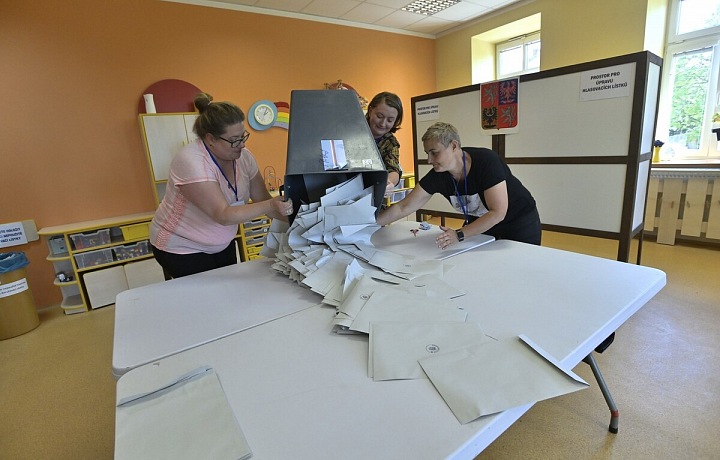Czechs will vote by correspondence for the first time. In some regions, they can mix up the results, but rather only theoretically.
For the first time, the autumn elections to the Chamber of Deputies will allow citizens to send votes from abroad by postal vote. The possibility to vote in a different way than in a polling station is possible in the vast majority of democratic countries, not only in Europe. According to estimates, there are up to 600,000 potential voters abroad during the election period. Although only a fraction of them voted in embassy polling stations, experiences from Slovakia show that the overall results of the postal vote will not be greatly affected, even if they could be.
All Czechs residing abroad must meet basic prerequisites in order to be able to vote remotely. The first of them is requesting to be included in the voters' list at the respective foreign embassy. Subsequently, it is then necessary to also request the sending of documents for the implementation of the vote. The second step is possible only after the election date is announced by the president.
Petr Pavel last week set the election date for October 3 and 4, so it is possible to combine both steps. Both tasks can be performed in person at the relevant embassy, through the Citizen's Portal or a data mailbox, which seems to be the most logical option. Countrymen living within reach of representative offices will thus be able to vote in person, just like in the past.
Voting passes are valid universally, even for postal voting
However, potential voters will not receive a physical ballot, authorities will only send them a voting envelope, and they will have to print it themselves according to the instructions, which will be delivered to them with the envelope. Those who don't have a printer at home will have to print the ballot at work, from friends, or in a copy center.
It would be advisable to carry out everything in time, as only votes that arrive at election commissions within the election deadline will be counted. The option applies to all Czechs who reside abroad. For example, even to "passionate travelers" who do not even know where they will be during the elections because they commute between different countries.
"The easiest way to carry out the voting process in various situations, such as voting abroad, where the voter is listed in the voter register (whether in the Czech Republic or in the USA), is to request a voter's card from the office where the voter is registered in the special voter list. With a voter's card, it is then possible to vote in person anywhere. If such a voter cannot make it to the polling place, they can use absentee voting. If they also have a voter's card issued, they must include it in the delivery envelope in which they send the absentee vote,"
As explained by the Ministry of Interior on their website, they also cover such cases.
From the described scenario, it is evident that it is impossible to precisely determine how many eligible Czech voters are abroad during elections. Estimates suggest that the new variant could affect up to 600,000 voters.
Since parliamentary mandates are distributed according to results in electoral regions (they duplicate administrative regions), the votes from abroad are counted towards four regions where more than 30 mandates are distributed, i.e., the four largest ones.
Electoral revolution in the Moravian-Silesian region? Perhaps it's only theoretical
The lots determined from which world regions, to which of these regions will the foreign voices travel. The smallest of the biggest regions in terms of last year's elections is the Moravian-Silesian region, where last year, approximately 578,000 voters cast their votes. The luck simultaneously assigned it to count the voices from the Western Europe region, where a large number of Czech compatriots live. According to the estimates of the Ministry of Foreign Affairs (MZ), there live about 100,000 Czechs only in Great Britain.
The region is also considered to include France or Spain, but no longer Germany. As the country with the second largest enclave of Czech compatriots after Britain, they would most likely create a disproportion in the votes cast. The United Kingdom and Spain are also the most popular destinations of the Erasmus student program, and absentee voting also applies to students abroad.
In theory, the most easterly Czech region could receive almost 200,000 postal ballots. That could be a quarter of the votes and given that the election results from abroad usually differ significantly from the dominant domestic ones, the new voting option could significantly shuffle the cards.
"Interest in mail-in voting will likely grow gradually, as it did in the case of Slovakia. After the introduction of mail-in voting, about 5,000 Slovaks voted abroad, today it's already around 60,000,"
pointed out director of the administrative and consular division MZ Martin Smolek for Free Vienna News.
Although there are overall fewer Slovaks, more of them pursue life abroad than in the case of the Czechs, and they live in larger numbers in various European countries. For example, in the mentioned United Kingdom, approximately 135,000 Slovaks live. The numbers are more than comparable.
Hundreds of thousands of votes in "Ostravian" ballot boxes will therefore hardly arrive, but perhaps a new method will attract a larger number of people than we see in the foreign example.
Sources: author's text, MZ, MV, CT, volby.cz. X.com, svataznalec.cz











